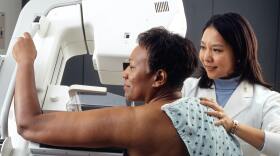-
Some doctors prescribe sublingual immunotherapy, known as SLIT, a serum taken as drops under the tongue. Patients like it, but it is not FDA-approved, so insurance usually doesn't cover it.
-
The U.S. Food & Drug Administration issued draft regulations in April 2022 to ban menthol cigarettes and flavored cigars, products used disproportionately by Black smokers.
-
More than 67% of all housing in Ohio was built before 1980 and is likely to have some lead-based paint, either inside or outside, according to the Ohio Department of Health.
-
Even before the U.S. Supreme Court overturned the landmark Roe v. Wade decision, scholars noted that states with the most restrictive abortion laws in the U.S. also had higher maternal mortality rates. Now, researchers warn, those death rates could get even worse.
-
House Bill 371 is a new Ohio law that aims to help more patients get the screenings they need to detect the disease more quickly.
-
After two Ohio State University students died of a possible drug overdose and a third was hospitalized, the university warned students of possible counterfeit Adderall pills laced with fentanyl in circulation. Resident Agent of Cincinnati’s DEA office Joe Reder says there's been an increase in fentanyl-laced pills in the area.
-
1 in 5 adults and teens live with mental health conditions. Now is the time to take care of yourselfMay is Mental Health Awareness Month, and the Cincinnati nonprofit 1N5 has a series of activities and speakers lined up to encourage everyone to address their own mental health.
-
About seven million Americans are immunocompromised, according to the American Medical Association. When the CDC released new masking guidelines last month, there wasn't a lot of detail about what those people should do.
-
Lucretia Bowman says she used to be a criminal stuck in a cycle of crime rooted in her trauma. Roughly five years after being released from prison, she and her husband invited five women struggling with addiction to live with them and work toward a faith-based recovery. It's been about 25 years since then, and on Wednesday, she and a community of supporters broke ground on the expansion of City Gospel Mission's women's residential recovery program.
-
It's a common misconception that people can access period supplies through government assistance. That's not the case.

Play Live Radio
Next Up:
0:00
0:00
Available On Air Stations










